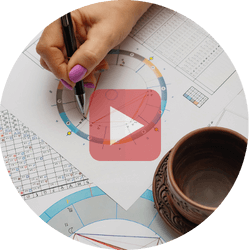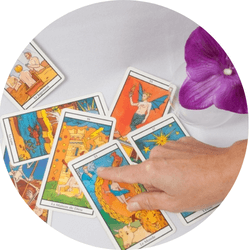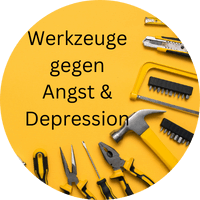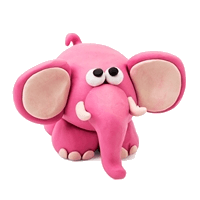
Astrology, psychology and the 10 actors in us
12. July 2022
Wie das Horoskop dabei hilft, Angst und Panik zu überwinden
15. January 2023Many years ago I wrote an article on how hypnotherapy can help with anxiety and depression ("Why Hypnosis Helps with Anxiety and Depression"). What I wrote then still applies today, of course.
But in the meantime I have learned a lot.
The good news is that there are many other approaches, methods and tools besides hypnotherapy that can be used to alleviate, overcome and ultimately resolve anxiety and depression. Because as anyone who has been affected knows: anxiety and depression is a highly complex issue. There is no miracle cure here, no magic pill, and no shortcut to get around the issue.
Classical psychotherapy is one way to do this. But unfortunately, it's not as easy as it sounds - because getting a psychotherapy appointment is anything but. In most cases, waiting times of several months to a year have to be accepted. If you then have the misfortune to find that "the chemistry is not right" with the appropriate therapist - then you have a real problem and can start all over again.
But even if you are lucky enough to have found a therapy place where everything actually fits - usually the treatment appointments are then only possible at intervals of several weeks. So progress or even healing is really only possible in baby steps. If at all.
As a result, more and more affected people are looking for other, new ways to tackle the issue. Although this then usually has to be done at your own expense. But in many cases, success can be achieved more quickly in such ways than with classical psychotherapy. A combination of classical psychotherapy and many of the methods I have described here is also possible.
So there is hope. There are ways to get help and, most importantly, to help yourself.
Because that is an absolute prerequisite for all (known to me) methods that work: your own active involvement. The will to do the necessary work to overcome fears and depressions, to recognize and use one's own strengths and to make real changes possible.
I have come to know and appreciate the following methods and tools in the course of my work as a coach and therapist.
Maybe there is also something for you?

Psychotherapy and/or good talks
Any good psychotherapy consists first and foremost of good conversations.
Which methods are used (depth psychology, behavioral therapy, systemic therapy, etc.) depends on the therapist, the topic and the situation. In the end, however, it is always about a good and intensive conversation.
Such a conversation is especially important at the beginning of a cooperation. Because often you've been struggling with depression or an anxiety issue for so long that sometimes you can't see "the forest for the trees." One sees no beginning, no end. You are no longer sure what started it all, you don't see the connections anymore (especially if the causes may lie far back or in childhood) and perhaps you haven't thought about what you would actually like to have instead of this problem for a long time. What life might be like if the depression or anxiety were suddenly just gone. That's why a conversation is always an important chance to see the "red thread" more clearly again. To clear the mind to be able to see what is really important.
In addition, such a conversation offers the opportunity to get things off your chest that you may not be able or willing to talk about so easily with partners, family, friends, etc. - a "neutral counterpart" can be helpful here. In other words, an interlocutor who (in addition to the professional experience and knowledge that is of course necessary) takes time, really listens and does so without judging, without arguing and, above all, without being part of the problem or topic himself.
Conversations are often not enough.
But they are an important and indispensable basis for good and trusting cooperation.

Hypnotherapy
Hypnotherapy is called the use of hypnosis (i.e. a trance state that makes the subconscious more accessible) for therapeutic purposes. The only reason for this is that hypnosis or the trance state makes it easier to access the subconscious mind. Be it to find hidden information (e.g. forgotten or repressed experiences or thoughts), or to discover new insights, ideas and possibilities. Because our subconscious mind works many times faster than the conscious mind - the subconscious mind is our creative part, here sits our imagination, our creativity, our imagination and our intuition. And since depression and especially anxiety are a product of our subconscious mind - the most obvious way is to work WITH the subconscious mind to make positive change possible.
Here too, as in psychotherapy, there are very different approaches such as analytical (depth psychology oriented) hypnotherapy, the more superficial suggestive hypnosis, as well as any number of other techniques that can be used in the trance state and achieve excellent results (e.g. parts work, age regression, future pace, phobia fast healing and much more).
And yes: hypnosis is of course possible at any time when working online, as long as you are not in an emergency mental situation or in a state associated with loss of reality (schizophrenia, shock, drugs, alcohol, psychotic episode, or similar).
Prerequisite for a good and also relaxing online trance work:
- Stable Internet connection
- The possibility to withdraw so that you can be undisturbed during our appointments.
- The ability to sit or lie comfortably during trance work.

Coaching & NLP
Regular coaching (e.g. via email or online app) is particularly important so that the time between treatment appointments is really used. This is because, unlike traditional therapy or psychological counseling, the main work in coaching takes place between appointments; the appointments are designed to talk about what has been achieved so far, to understand and resolve any difficulties or blockages, and to set goals and tasks until the next appointment.
Especially when working on depression and anxiety issues, coaching and therapy always go hand in hand to ensure that the insights and positive changes achieved in therapy are also lasting and do not simply disappear again in the hectic everyday life. This work is particularly important in the case of fears and phobias, since in anxiety disorders the original fear often changes over time to a "fear of fear". Therefore, insights or understanding the connections are often not sufficient here, because the corresponding neuronal networks have already become so entrenched that changes (i.e., the construction of new, non-anxious neuronal pathways) must be downright "trained."
In the context of coaching (whether via eMail, online app or consulting appointments), the following things are important and helpful, for example:
- Analyze the problem: Where exactly is the problem? What is the core of the issue? Which thought or inner image creates the problem, e.g. the fear?
- Define goals: What do I want to change? Why do I want to change it? How much am I willing to work for this change? How important is this change or goal to me?
- Tools, methods and exercises for achieving goals, e.g. in the form of worksheets, daily exercises, reminder emails and more.

Psychological horoscope analysis
An in-depth, psychological-archetypal analysis of your horoscope can actually be a very helpful change tool. Because your horoscope tells a lot about you, such as:
- Your strengths and talents and how you can best use them.
- Things about yourself that you can't (or won't) see before and how you can change them.
- Key challenges or roadblocks you are dealing with and how to deal with them.
- Certain areas of life that are particularly important to you.
- Issues from the past and your childhood that still have an impact on you today.
- Professional issues that can be helpful.
- Things to keep in mind in relationships.
- And much more.
Why this is helpful?
Working with anxiety and depression is often so difficult or lengthy because they are very complex issues that can have multiple causes.
When only behavioral therapy is used, the deeper causes of depression or anxiety are often not addressed. Therefore, the successes here are often quite modest.
Or depth psychology is used - but finding possible causes and triggers is complicated and lengthy.
The horoscope can help in both cases: It can give us a variety of clues about the backgrounds and causes of depression and anxiety. At the same time, it can also show us resources, that is, strengths and abilities that you have and that you can use to make positive changes in your life.
The analysis of your birth chart can be done during a counseling appointment, but is also available from me as a video created individually for you. Such a video has many advantages: you can watch it in a concentrated way and take notes on it. Of course, you can always look at it again. And it's also a little less expensive than a counseling appointment.

Coaching with cards
Work with cards in the broadest sense and especially work with cards with pictures has long been an integral part of psychotherapy and coaching. Do a search on amazon for the term "therapy cards" and you'll quickly see what I'm talking about.
Because cards (and especially picture cards, of course) are a great way to stimulate our subconscious. In this way, ideas, insights, solutions and possibilities arise that one never thought of before on a conscious level - because our conscious thought carousel often blocks itself and stands in the way. Our subconscious mind is much more creative and thinks up to 10,000 times faster than our conscious mind. And that is why coaching with cards can be a very valuable and helpful change tool in the therapy of depression and anxiety.
In my work I use various coaching and therapy cards for this purpose, but I especially like to work with tarot cards. This kind of card reading has of course nothing to do with stupid fortune telling, even if it is what most people think - but in the meantime I have become old enough to be completely relaxed about the here and there "raised eyebrow" 😉 .
The language of these cards, rich in imagery, is so profound that the effects here are particularly intense. Also tarot cards have per se first of all nothing magical, supernatural or somehow spiritual in itself. Just like "normal" therapy cards, they are initially just a piece of cardboard with paint on it. As with everything, it depends on what you do with it. However, often the indications of the cards are so incredibly accurate and helpful that it is hard not to consider the possibility of some kind of spiritual component here. But since I'm a very practical person, I basically don't care why that is: working with (tarot) cards is beautiful and super helpful. Period! 😊
Coaching with cards I offer of course in the context of each consultation appointment, gladly however also uncomplicated and inexpensive as email consultation (with therapy-needy fears and depressions only additionally or in the connection of a therapeutic co-operation).



